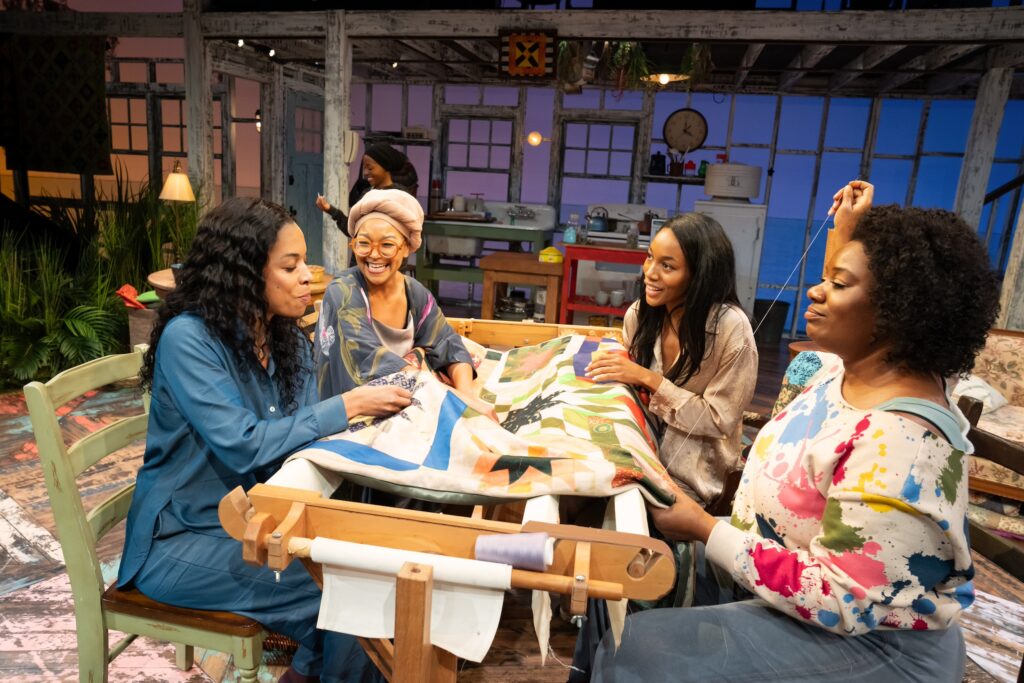Four Sisters’ Fractious but Ultimately Loving Relationships Are Focus of Katori Hall’s ‘The Blood Quilt’
The roots the Pulitzer winner explores here go deep: One scene featuring dancing channels the spirits of African women who became slaves, whose stories are woven into the assorted quilts adorning the set crafted by the family’s women.

The nice thing about family dysfunction — in art, that is — is that whatever particulars are involved, they can have universal resonance, if skillfully approached. The latest play from Pulitzer Prize winner Katori Hall, “The Blood Quilt,” is a case in point.
Ms. Hall’s focus in “Quilt” is on four sisters who are reunited after their mother’s death. Clementine, who’s apparently single, is the eldest, and was the closest to their mom. Gio, a police officer, has the biggest mouth; embroiled in what’s clearly a nasty divorce, she self-medicates with marijuana, as Clementine alternately disapproves and shares her supply.
Cassan is an Army nurse, married to another military officer whose work keeps him away from home, leaving her to raise their restless teenage daughter, Zambia, on her own. Amber, the baby, who turns up late, is the most successful on the surface — a graduate of prestigious schools, she works at Hollywood as an entertainment lawyer — but she harbors at least one of numerous dark secrets that will emerge during the play’s two acts.
The women all meet at their childhood home on Kwemera Island, off the coast of Georgia, with Zambia attending as well. As designed by Adam Rigg for this production, it’s a cozy and stylish sanctuary; unfortunately, the late matriarch did not keep up with the payments it required, and has left her daughters with a staggering debt — and a will that, when revealed, exacerbates already festering tensions between them.
These material concerns are further complicated by emotional and spiritual ones, some of which are reflected in the quilts that women in their family have sewn for generations, as evidenced by a series of handsome items adorning the set. Throughout the play, in fact, the sisters are engaged in crafting a new one, per their mother’s wish.

They pursue this task with varying degrees of enthusiasm. Clementine, predictably, is thoroughly dedicated; played by a sparkling Crystal Dickinson, she exudes both grace and fire, and a sense of patience that, however noble, is clearly not infinite. An “Orange is the New Black” alumna, Adrienne C. Moore, brings spunk and sardonicism to Gio, while making it plain that the character isn’t as tough as her talk suggests.
Cassan, while not free of resentfulness regarding her lot, appears to be the most stoic of the group, and Susan Kelechi Watson conveys her forbearance with a weary elegance. And Mirirai captures the innocence and kindness underlying Zambia’s curiosity and mild rebelliousness. (The girl enters wearing a hijab; her mother explains, “She wants to be Muslim, nah. Last week she wanted to be Goth. The week before that a vampire.”)
We learn that, of the sisters, Amber was the mother’s favorite — that’s their perception, anyway — and Lauren E. Banks’s performance in the role evokes both the perks and the weight of that position, and of other factors. Initially sleek and self-assured, Ms. Banks acquires a more frustrated and haunted edge as revelations start coming forward: among them a sense of how much the others have relied on and continue to expect from her.
Director Lileana Blain-Cruz traverses the often fractious but ultimately loving relationships between the women with compassion and humor, as Ms. Hall emphasizes the role their heritage plays in binding them to each other, and to their ancestors. There is talk about the unique character of the island, in contrast to the mainland, but the roots explored here go deeper than that: One scene featuring dancing channels the spirits of African women who became slaves, whose stories remain woven into the assorted quilts.
It’s an especially stirring moment, but the play’s simple message of continuity, and the conflicts that accompany it, never feel exclusive. Mss. Hall and Blain-Cruz appeal to all of us to explore and remember where we came from, and to value those who surround us at our point in the journey.

